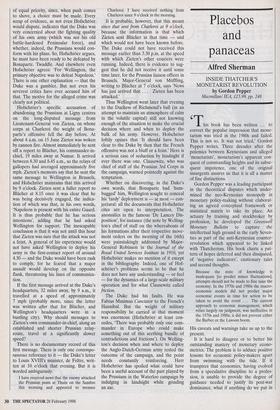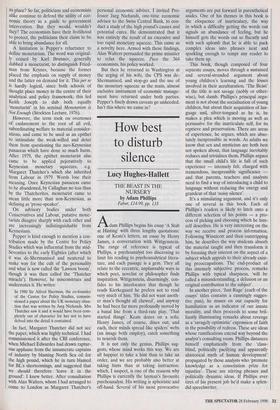Placebos and panaceas
Alfred Sherman
INSIDE THATCHER'S MONETARIST REVOLUTION by Gordon Pepper Macmillan' lEA, £15.99, pp. 248 This book has been written ... to correct the popular impression that mone- tarism was tried in the 1980s and failed. This is not so. It was not tried,' Gordon Pepper writes. Three decades after the polemics between Keynesians and alleged `monetarists', monetarism's apparent con- quest of commanding heights and its subse- quent impotence, one of the original insurgents assures us that it is all a matter of fine distinctions.
Gordon Pepper was a leading participant in the theoretical disputes which under- mined the neo-Keynesian monopoly in monetary policy-making without elaborat- ing an agreed conceptual framework or statistical matrix to take its place. An actuary by training and stockbroker by profession, he developed the Greenwell Monetary Bulletin to capture the intellectual high ground in the early Seven- ties as part of the anti-Keynesian counter- revolution which appeared to be linked with Thatcherism. His book charts a pat- tern of hopes deferred and then dissipated, of 'negative indicators', cautionary tales and second thoughts.
Because the state of knowledge is inadequate [to predict minor fluctuations], attempts should not be made to fine tune the economy. In the 1970s and 1980s the macro- economic models did not predict major economic events in time for action to be taken to avoid the event .. . The current approach to economic management, which relies largely on judgment, was ineffective in the 1970s and 1980s; it did not prevent either the Barber or the Lawson boom.
His caveats and warnings take us up to the present.
It is hard to disagree or to better his outstanding mastery of monetary econo- metrics. The problem is to adduce positive lessons for economic policy-makers apart from swimming with the tide. If it transpires that economics, having evolved from a speculative discipline to a profes- sion, is unable to provide the degree of guidance needed to justify its post-war dominance, what if anything do we put in its place? So far, politicians and economists alike continue to defend the utility of eco- nomic theory as a guide to government intervention. But they would, wouldn't they? The economists have their livelihood to protect, the politicians their claim to be able to bring abundance for all.
A limitation is Pepper's reluctance to define monetarism. The word was original- ly coined by Karl Brunner, generally dubbed a monetarist, to distinguish Fried- man from Keynes, because the former placed the emphasis on supply of money and the latter on demand for it. This per se is hardly logical, since both schools of thought place money in the centre of their analytical and policy framework; this led Keith Joseph to dub both equally `monetarist' in his seminal Monetarism is Not Enough (Stockton Lecture, 1976).
However, the term took on overtones of enslavement to the root of all evil, subordinating welfare to material consider- ations, and came to be used as an epithet to intimidate the weak-willed and deter them from questioning the neo-Keynesian panaceas which have done so much harm. After 1979, the epithet monetarist also came to be applied pejoratively to Keynesian monetary squeezes, e.g. Margaret Thatcher's which she inherited from Labour in 1979. Words lose their meaning. Once Keynesian panaceas came to be abandoned, by Callaghan no less than by the Thatcherites, monetarist came to mean little more than non-Keynesian, as defining as 'prose-speaker'.
On advisory bodies under both Conservatives and Labour, putative mone- tarists disagree sharply with each other and are increasingly indistinguishable from Keynesians.
Pepper is kind enough to mention a con- tribution made by the Centre for Policy Studies which was influential from the mid- Seventies to the early Eighties (after which it was de-Shermanised and neutered to make way for the cult of the personality and what is now called the 'Lawson boom', though it was then called the 'Thatcher miracle'). However, he misconstrues and understates it. He writes: In 1980 Sir Alfred Sherman, the co-founder of the Centre for Policy Studies, commis- sioned a paper about the UK monetary situa- tion that was written by Jurg Niehands. Mrs Thatcher saw it and it would have been com- pletely out of character for her not to have delved into the detail it contained.
In fact, Margaret Thatcher did not see the paper, which was highly technical. I had commissioned it after the CBI conference, when Michael Edwardes had drawn raptur- ous applause from the innumerate captains of industry by blaming North Sea oil for the high pound, which he in turn blamed for BL's shortcomings, and suggested that we should therefore 'leave it in the ground'. I knew better. After consultation with Alan Walters, whom I had arranged to come to London as Margaret Thatcher's personal economic adviser, I invited Pro- fessor Jurg Niehands, one-time economic advisor to the Swiss Central Bank, to con- duct a study of the high pound's causes and potential cures. He demonstrated that it was entirely the result of an excessive and too rapid monetary squeeze. This came as a novelty here. Armed with these findings, Alan Walters persuaded the prime minister to relax the squeeze. Pace the 364 economists, his policy worked.
But then he returned to Washington at the urging of his wife, the CPS was de- Shermanised, and stop-go and the use of the monetary squeeze as the main, almost exclusive instrument of economic manage- ment have returned under both parties. Pepper's finely drawn caveats go unheeded. Isn't this where we came in?



























































 Previous page
Previous page